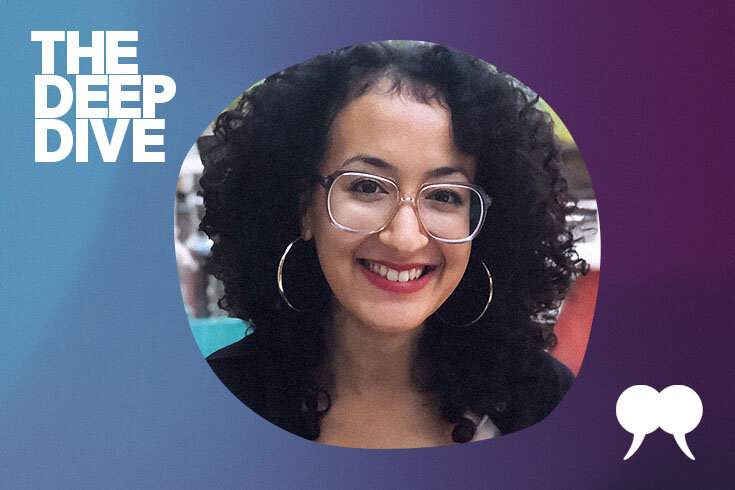Powered by RedCircle
SOURCES USED IN THIS EPISODE
The music for this episode is a licensed version of “This Podcast Theme” by InPlus Music. Additional music are licensed versions of “Stay Cool” by Loops Lab, “Podcast Intro” by InPlus Music, and “Ethereal Relaxation,” by Kevin MacLeod.
LINKS:
SIMRAN: Welcome to a special bonus episode of The Deep Dive – a weekly podcast that takes a deeper look into the happenings at The Walrus. I’m Simran Singh.
YASMIN: And I’m Yasmin Duale. On this week’s episode:
TAJJA: It was important to me throughout that none of the book feel complain-y, and kind of take the reader through through this tour that does point out certain landmarks like ‘yeah, that’s not great’ and ‘here’s a problem’, but that does so in a way that feels like we are sharing in a conversation. Like, the sort of dominant move is like ‘hey isn’t that weird’, or ‘isn’t that funny’, or ‘isn’t that bazar’, or ‘haven’t you felt this too’? Rather than anything that feels finger point-y.
SIMRAN: Two former voices from The Walrus – the one you just heard is Tajja Isen, who was our digital editor, and is now an editor-in-chief at Catapult magazine.
YASMIN: On the other end of the mic is digital director Angela Misri who, by the time this episode is available, will have moved on to TMU as their newest assistant professor.
SIMRAN: Angela and Tajja talked about her new book, Some of my Best Friends: Essays on Lip Service. It’s an essay collection about race, justice, and the limits of good intentions.
YASMIN: It’s our last episode of the season (no really this time) but we hope you will share it widely and stay tuned for Season 2 of The Deep Dive.
TRANSCRIPT:
ANGELA: I’m going to go out on a limb and say that this book is not meant to be representative of every person of colour’s experience in these creative industries. I felt like this was very much you describing little vignettes of your life and you’re sharing them to start these conversations about what we say and what is left unsaid.
TAJJA: Yeah, definitely. I think, I mean, I haven’t, I’ve lived a very lucky life, but it hasn’t been a representative one. Um, and I very much wanted it to be, um, like the book is a journey. It’s very much the journey that I was on and the work that I was doing to sort of puzzle through some of these kind of questions that we see resurfacing in culture. And, um, while I very much hope that it sort of illuminates things for the reader and gives pleasure to the reader. Um, it’s also just me trying to figure a lot of stuff out and is therefore sort of very specific to my preoccupations and my interests and my concerns and my, um, my way of seeing the world. But that’s what I, you know, I wanted to do. I wanted to sort of present a worldview.
ANGELA: I think, depending on how you come at this book with your own baggage, you’re going to take different things from the book. Have you noticed that when you’re talking to other people who’ve have read your books?
TAJJA: Absolutely. Um, cuz and that’s, you know, in some ways that’s, that’s great and is very much the sort of thing I was going for. Um, you know, when somebody says, oh, this, you know, the way you talked about your experience in journalism just made me feel sort of, I thought, oh finally someone has articulated that. Like I love to provoke that reaction in a reader. Like thank you. I have been waiting for somebody to put words to that. But also just because of the nature of the book and because it’s about things like, you know, inequity and sort of systemic discrimination, people are gonna sort of bring very weird baggage to it too. And they are going to read me as representative of like all racialized people. And um, I think a really common misreading of the book is that I am talking about how hard it is to be a minoritized person. And I’m, I’m not at all. Like that was not sort of, that’s not how I feel. It’s not where I’m coming from. It’s not even really in the book
ANGELA: Something I thought about when I was reading it is, ‘I wonder if people think, wow, this woman has been so successful. Like what is she even going on about? you’ve done a lot, you’ve accomplished a lot in the time that you’ve been on this earth. I’m sure there are people who read it and go, well, she’s super successful. Like what is even this about?
TAJJA: Yeah. I mean, that sort of reading where it’s like ‘what is she complaining about’ is a very, sort of, it’s a worldview that’s at risk of being very tokenizing. It’s like, okay, well there’s one person of colour in this space. Therefore we fixed it. Um, and that’s exactly the sort of move that the book is kind of meant to pick apart and critique and unpack.
Like I always wanted it to sort of have a sense of curiosity and joy and fun and interest. It was important to me throughout that none of the book feel complain-y, and kind of take the reader through through this tour that does point out certain landmarks like ‘yeah, that’s not great’ and ‘here’s a problem’, but that does so in a way that feels like we are sharing in a conversation. Like, the sort of dominant move is like ‘hey isn’t that weird’, or ‘isn’t that funny’, or ‘isn’t that bazar’, or ‘haven’t you felt this too’? Rather than anything that feels finger point-y.
ANGELA: There are nine specific stories, in this book: how did you approach each one? Did you just like bullet point the whole thing out and you’re like, I’m gonna talk about this …?
TAJJA: Um, that is, that’s a great question. Um, weirdly enough, the essays appear in the book more or less in the order in which I wrote them
And what I sort of discovered as I was writing it was that I had sort of, I had kind of arranged the pieces so that they started with me as a much younger person. You know, it opens with me as a kid going to cartoon auditions. Um, and it sort of, it closes with, with me sort of at presence slash in the future about to move to the US, which is not at this time, something that I, you know, I haven’t made the physical move yet. Um, and you know, that, that, that kind of progression was something that I teased out in revisions. Um, the first draught that I filed to my editors, they said, you know, this is great. This is really smart. You’ve done really, you know, sharp analysis, but there’s not enough of you in the book. Like, like where are you?
ANGELA: I think, yeah. I mean, I can’t believe there was a version without so much of you in it. I love how much of you, it, this, this is amazing out of these chapters, which was the hardest to write. I have a guess, but I want to hear what the hardest one was to write?
TAJJA: Oh, interesting. Um, I feel like my answer to this fluctuates, but, “Tiny White People” was hard to write in part because it was the first piece that I, it was the first piece that I wrote for the book, but it was also a piece that I published a version of five years ago. Um, and my, just the way I think about questions of representation of the literary cannon, um, have evolved quite a lot in time. And I think I thought I was going to, I’m still very proud of that earlier version of the essay, but I thought I was going to be able to rely on it more than I was. I ended up just kind of stripping the whole thing to the studs and rewriting it, not preserving even a single sentence, um, which was kind of a, a big hump to get over at the very beginning of drafting a book
ANGELA: See, I guessed diversity hire, and that just shows you the baggage that I bring to your book ah, is that I read that chapter and had read again, because it was very satisfying again, as you said that someone articulated something I felt for a long time.
ANGELA: Can you talk a little bit about absolution in your book and how you talk about it because it’s in many different chapters? Can you talk a little bit about that idea of an agenda of absolution?
TAJJA: Yeah. I, first of all, I’m so grateful that you noticed that that’s not like I hadn’t thought of absolution as a sort of thread that runs through the book, but you’re absolutely right. As someone who, you know, has been called upon to do what I call in the book diversity work where you’re sort of brought in, because the workplace or the, you saw the, industry has recognised that there is a problem that there, you know, the space is majority white. In that situation I, you know, have often felt like it’s, it’s always been presented to me that absolution is the goal it’s like, please fix, please fix this place. You’re here. It is your job to fix this place. Um, and I guess the argument that I make across the book is that that’s the wrong goal.
It should not be on me, on you, on us, on the tiny little ad hoc diversity committee that’s thrown together at the 11th hour, to fix anyone that that kind of work is, I mean, it’s not our job. It will burn us out. It often happens at the expense of genuine investment in, what will make a space more equitable, which almost always involves more money and resources, which a lot of institutions don’t wanna cough up. So my, my sort of a shift that’s been really helpful for me, in just my own life and also in my writing is to kind of re-conceptualize the goal. So that it’s more about getting someone else in the room with you. It is about sort of opening the door, um, getting people in there, making sure you’re not the only one, um, which is a very different goal from, you buffing up a place to make it look good.
ANGELA: My next question for you is how has this part gone? How has your book coming out, different people interviewing you? How has that gone in terms of the things we say and the things we don’t say, how is how, and be as honest as you can.
TAJJA: Thank you. It’s hard. It’s, it’s been, it’s been difficult. Like I I’ve been for the most part wildly lucky in terms of the conversation partners I’ve had, like everyone I’ve done events with has been perfect and incredible and has, you know, gotten the book. Um, but I have very much felt, like, I have expended more energy than I thought on just trying to control the conversation around the book. And it’s, it’s so easy for it to veer into ‘Taja Eisen writes about how hard it is to be black’ or people thinking that I’m suddenly an expert on cancel culture, which the book is not about or
Like from the beginning have always wanted this to be talked about like it’s a serious work of literary and cultural criticism, and does different and fresh things with the essay as a form and is funny. And I don’t think that the, even the, the publishing industry, the media industry, as it exists has a robust language for talking about those kinds of books when they are by people of colour when they are about things like, systemic inequity, um, it’s just, it’s what it does have a very sort of big appetite and language for is books that are about, you know, about suffering, about trauma, about, and those books exist and they’re great, but it’s, it just becomes very easy for like my book to be talked about like it is something that it’s not, um, and that
ANGELA: Honestly they want to put it on a bookshelf. They want to put it on a specific bookshelf that they’ve already reserved for you.
TAJJA: Yeah. And that’s, that’s hard and disheartening and something that is very weird to like process in real time while trying to promote a book.
ANGELA: I think that’s such a surface reading of your book and you’re right, the publishing industry and you’ve written about this and you’ve edited stories for us about this about the publishing industry, not having the language. Last question here: I’m not gonna look to you for solutions, but with all this experience in mind, if you had to advise someone writing their next book, is there any advice you would give them?
TAJJA: I think write the book you wanna write and stay true to that vision, even if it doesn’t conform to what happens to be easily sellable at that moment. Like, I, I do think that although the pace of change is absolutely glacial, even that the landscape of what’s permissible in terms of storytelling is so different now from how it was even, you know, 5, 10 years ago, especially if you’re someone who writes, who works in, you know, creative non-fiction, personal essay territory, I think finding and working with people that you trust, no matter how long that takes, um, and spending a lot of time with your work before you are ready to share it.
I think there’s a lot of harm that can come from putting work out into the world before it’s ready, because it happens to be the thing that publishing has an appetite for at that moment. Um, and that’s why I feel so lucky to be an editor too, is because I get to sort of, find new people, nurture them, um, and like help them through the process of publication. It’s not just about finding the story that people wanna read, but sort of making sure that the writer is ready to make that story public and help it find its audience.
CREDITS
YASMIN: Thanks for joining us on this week’s BONUS episode of the Deep Dive. This week’s episode was produced by Angela Misri, Simran Singh and me, Yasmin Duale. Angela Misri edited this episode.
Thanks so much to Tajja Isen for joining us. An excerpt of her book, Some of my Best Friends: Essays on Lip Service is up on our website. Find a link in our show notes.
SIMRAN: Music for this podcast is provided by Audio Jungle. Our theme song is This Podcast Theme by Inplus Music. Additional music is Stay Cool by Loops Lab, and Podcast Intro by Inplus Music and “Ethereal Relaxation,” by Kevin MacLeod.
Ethereal Relaxation by Kevin MacLeod
Link: https://incompetech.filmmusic.io/song/8719-ethereal-relaxation
License: https://filmmusic.io/standard-license
Don’t forget to subscribe to Deep Dive from The Walrus on Apple Podcasts, Spotify, or wherever you get your podcasts.









